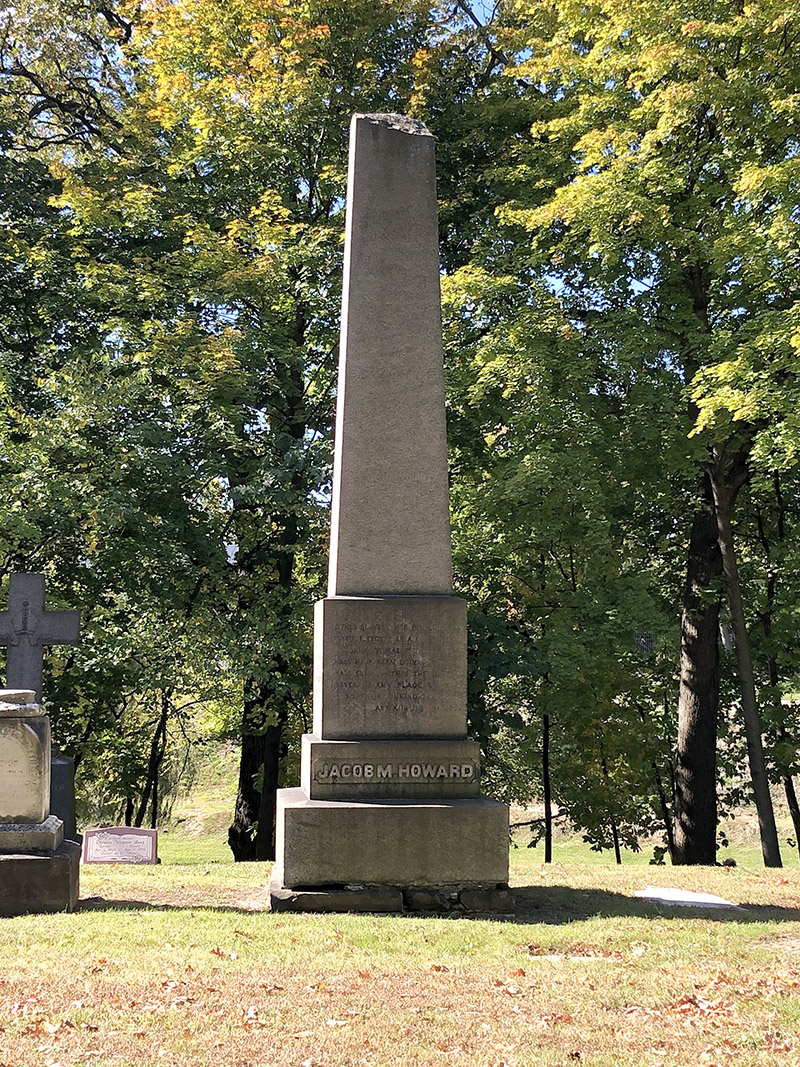 Click here to view or download a PDF.
Click here to view or download a PDF.
Jacob Merritt Howard was born in Vermont on July 10, 1805 and educated in Massachusetts. He married Catherine Amelia Shaw and they had seven children. Howard, an eloquent orator, was a lawyer and politician. He was elected Detroit Attorney in 1834 and state representative in 1838. He was Michigan Attorney General from 1855 to 1861. As one of the founders of the Republican Party, he wrote the resolutions upon which the Republican Party was founded with a key element seeking to end slavery. He made political and legislative history in Michigan and in our nation’s capitol. Howard was known to shelter freedom seekers. In 1850, when arguing a fugitive slave case before the U.S. circuit court, he publicly denounced the Fugitive Slave Law and predicted that the country would eventually come to armed conflict over the issue of slavery.
Educated as a lawyer, he applied his training and legal mind to the problems he encountered in politics and the legislature. His most significant body of work was done during the period from 1862 to 1871 while he was the U. S. Senator from Michigan. As a Senator, he brought his political philosophy to the problems that were confronting the nation at the time. He felt that the South was wrong and that the Union had to win the war and reunite the nation. He supported conscription, confiscation of property and retaliation for crimes against the nation. To him the real national power was centralized in the legislative body; therefore, Congress had the right to direct the armies, to establish the time and pace for reconstruction and to control the appointive power of the President. He vigorously pressed for the conclusion of the war and when the war was over, he was active in reconstruction.
Following the Civil War, his actions led to the creation of the 13th, 14th and 15th Amendments to the U. S. Constitution. He felt that Congress could enforce the 13th which freed all those subjected to slavery. He then considered the need to protect the rights of all Americans, thus the 14th Amendment which upholds human rights of those freed from slavery was passed. Howard was one of six U. S. senators to serve on the Joint Commission for Reconstruction.
Few men in this country have the opportunity to make significant changes to our Federal Constitution. Jacob M. Howard, in his lifetime, wrote state and national laws whose principles and precepts are still observed today. He is recognized as one of the most conscientious, hardworking, sincere and principled men in 19th century politics. He deserves honors for his contributions to the laws of the land. As U. S. Senator, he was in a position to help create what America is today.
His once familiar name should continue to be honored as one of Michigan’s and the country’s most able and highly influential political figures.
Howard died on April 2, 1871. Words of the 13th Amendment are inscribed on his monument in Elmwood Cemetery. The monument is pictured below and stands in Section B, Lot 90-91.


This material is based upon work assisted by a grant from the Association for the Study of African American Life and History (ASALH), funded by the Department of the Interior, National Park Service. Any opinions, findings, and conclusions or recommendations expressed in the material are those of the author(s) and do not necessarily reflect the views of ASALH or the Department of the Interior. Elmwood Cemetery’s Network to Freedom Application was completed by Carol Mull and Gabrielle Lucci. This biography was completed based upon the Application and records available through Elmwood Cemetery, Detroit Historical Society, Burton Historical Library, Military Records of the United States, Michigan Historical Center, and various information sources.
